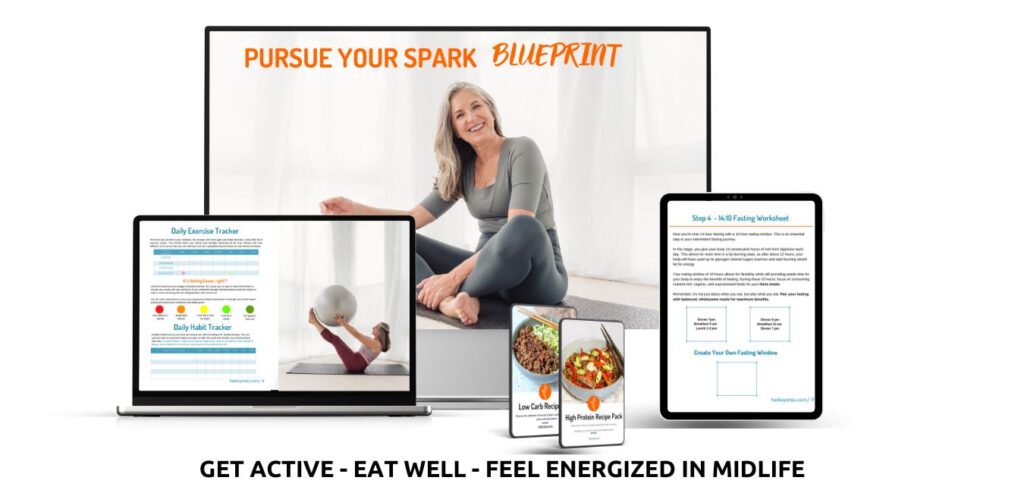We’re right in the heart of the holiday season, a time filled with joy, laughter, and, let’s be honest, a lot of delicious temptations. But here’s the twist: how do we stick to our intermittent fasting goals amidst all these festive feasts and social gatherings? It’s not just about resisting that extra slice of pie; it’s also about handling the friendly nudges from Aunt Linda, who insists you try her famous stuffing. You want to continue to practice Intermittent Fasting but might feel guilty. I want to share 5 holiday intermittent fasting tips to beat the social pressure you might feel.
The key to navigating this period is setting clear goals and developing a resilient mindset. By understanding and planning for the holiday temptations, we can apply effective strategies to stay on track with intermittent fasting, even amidst the seasonal festivities. It’s about embracing the spirit of the holidays while still honoring our commitment to health and wellness instead of navigating a food minefield. And not feeling that we are missing out!
But fear not! Today we’ll explore practical strategies and empowering mindset shifts to help you confidently maintain your fasting goals and enjoy the holiday season.
Tackling the 4 Holiday Stressors
Amid the holiday cheer, many midlife women face unique pressures. It’s not just about the festive preparations or managing family expectations; it’s also the internal conflict that comes with maintaining personal health commitments, like intermittent fasting, in a season that’s all about indulgence. This pressure can manifest in various ways:
- Guilt: Feeling guilty for either breaking the fasting routine or not partaking in the festive eating, leading to a sense of being caught between a rock and a hard place.
- Stress: The stress of managing expectations – both our own and others. This could be from family members who don’t understand our health choices or internal standards we’ve set for ourselves.
- Isolation: Feeling isolated or left out during social gatherings, especially when food is a central celebration aspect.
- Overwhelm: The sheer overwhelm of navigating numerous social events can sometimes lead to temporarily abandoning health routines.
Recognizing and validating these feelings is the first step in finding effective strategies to manage them. Nobody expects you to be perfect and Intermittent fasting is flexible, including numerous holiday parties.

Navigating Social Pressure While Intermittent Fasting.
The concept of intermittent fasting is often misunderstood, leading people around you—like friends or family—to inadvertently pressure you to break your routine. You’ve probably heard comments like, “Oh, come on, one meal won’t hurt!” or, “Are you sure you should be starving yourself?” It’s essential to approach these situations with tact but also with firmness.
5 Holiday Intermittent Fasting Tips to Beat Social Pressure
- Stick to Your Guns
First off, remember why you started intermittent fasting. You have your reasons, whether it’s for weight loss, increased energy, or other health benefits. When faced with social pressure, revisit your motivations to help you stick to your guns. It’s okay to decline food offers outside your eating window politely.
Example: Imagine you’re at a holiday party, and a friend offers you a slice of your favorite pie. It looks delicious, but it’s outside your eating window. You remember the reasons why you started intermittent fasting: perhaps you wanted to manage your weight, improve your energy levels, or support your overall health.
With these motivations in mind, you smile and say, ”Thank you, but I’ll have to pass this time. I’ve committed to a specific healthy eating schedule, and I’m trying to stick to it. But I appreciate the offer!” This approach allows you to stay true to your goals while acknowledging the offer’s kindness.

- Educate Without Preaching
If people question your choices, offer a brief explanation without diving too deep into the science—unless they’re genuinely interested. Understanding the”why” behind your actions can sometimes silence the critics. Just be sure not to come off as preachy; nobody likes a sermon at the dinner table.”If people question your choices, offer a brief explanation without diving too deep into the science—unless they’re genuinely interested.
Here’s an example of how you might respond in a way that’s informative but not preachy:
“Relative:”I noticed you’re not eating with us. Is everything okay? Why are you skipping meals?”
“You: “Thanks for asking! I’m actually following an intermittent fasting schedule. It’s a way of eating that aligns with certain times for eating and fasting. I find it helps me feel more energetic and focused. But don’t worry, I’m not starving myself! I’ve just shifted when I eat to suit my body’s needs better. I’m still enjoying all the delicious food, just at different times. Let me know if you’re curious about it; I’d be happy to share more.”
This response is friendly and open, providing a brief explanation without delving too deeply into technical details. It reassures your relative that you’re okay and opens the door for further conversation if they’re interested, but it doesn’t force the topic on them.
- Offer Alternatives
Suggest activities that must be included if a social gathering is centered around food. Propose a post-meal walk, a game night, or other non-food-related activities. This helps you stick to your fasting schedule and encourages healthier habits all around.
Resources: 7 Effortless Ways To Sneak In Exercise During The Holidays

- Make it a Non-Issue
If discussing your fasting isn’t something you’re comfortable with, there are subtle ways to navigate around it. You can casually mention that you’ve already eaten or suggest that you’re managing your nutritional needs differently during the holidays. Often, the key is to avoid bringing attention to your fasting routine.
For instance, if you’re at a holiday brunch and someone offers you a plate, you might say,” Thanks, but I had a hearty breakfast earlier, so I’m good for now!’ This simple statement shifts the focus away from fasting and more towards a regular eating pattern, making it easier for others to understand without delving into the specifics of your intermittent fasting.
- No Guilt, No Shame
Don’t feel guilty or ashamed of your lifestyle choices, especially if they work for you. Social pressure often comes from a place of misunderstanding or, in some cases, other people’s insecurities about their habits. Don’t let others’ opinions derail your progress or shake your confidence.

4 Strategies to Overcome Social Pressure During Fasting
It’s natural to want to fit in, especially in social settings where food is central to the experience. However, checking in with yourself and how these situations make you feel is essential.
Here are some concrete steps to handle social pressure:
- Prepare Your Responses: Before heading into a social situation, have some prepped answers for common questions or comments you may get. The key is to keep it simple and not overly defensive. For example,” I find that intermittent fasting works well for me” is often sufficient.
- Set Boundaries: Make it clear that your eating habits are not up for debate. If someone insists on discussing it, politely steer the conversation away. You’re not obliged to defend your lifestyle choices.
- Find an Ally: Sometimes, it’s easier to navigate social situations when you have someone who understands or even shares your perspective. It could be a friend, a family member, or a community online.
- Redirect the Conversation: Learn the art of elegantly changing the subject. This doesn’t mean you’re avoiding the issue; you’re merely choosing not to engage in a discussion that serves no purpose other than to create tension. This can be harder than it looks, but I got you and have some tactful comebacks to change the subject for you.

Here are a few tactful ways to change the subject
- Shift the focus to the person you’re speaking with. For example, “That’s a lovely dish you’ve brought! How did you come up with the recipe?” This turns the conversation away from your eating habits and onto something pleasant and engaging.
- Redirect to the event itself. Say something like, “Isn’t this a wonderful gathering? How do you know [the host]?” This naturally moves the conversation away from personal dietary choices.
- Bring up a neutral but engaging topic. “Have you seen any good movies lately?” or “I heard you recently went on a trip; I’d love to hear more about it!” These topics will likely capture the other person’s interest and shift the focus.
- Offer a genuine compliment.”I really admire your dress/jewelry/etc. Where did you find it?” People generally respond well to compliments, which can smoothly steer the conversation in a new direction.”Offer a genuine compliment.
- “If it feels appropriate, bring up a neutral current event or shared interest. “Did you catch the latest [sports game/art exhibit/local event]?
- Be Confident, But Not Confrontational: There’s a fine line between standing your ground and being combative. Confidence can often silence critics, but it’s generally not worth the energy to engage in a debate if someone is determined to make an issue of your choice.
Resource: 3 Things You Can Do To Boost Self-Confidence
Celebrate the Wins
Did you successfully navigate a social situation without caving to pressure? That’s a win! Acknowledge these victories, no matter how small. They build up your resilience and confidence over time.

Remember, this journey is all about you and your well-being. You’ve chosen intermittent fasting as a path to better health, and that’s something to be proud of. It’s your commitment, your body, and your goals. When faced with social pressures, whether from family or colleagues, stay true to yourself and why you started this journey.
And know this – you’re not alone. I’m here with you every step of the way. You have my support and the support of a community that understands your challenges and celebrates your successes. Together, we can stand strong and focus on what truly matters – our health and happiness. You’ve got this, and I’ve got your back!
🌟Pursue Your Spark Blueprint: Dive into our 8-week online group course, specially crafted for women in midlife. It’s more than just a program—it’s a life-changer. Learn to eat better, move more, and unlock boundless energy. With my guidance, you’ll step into a life of strength and confidence. Join me to transform your health and step into your most confident self. Ready for a change? Apply here.